Thaal Pe Charcha: A Sahiyo flagship event where Bohra women bonded over food
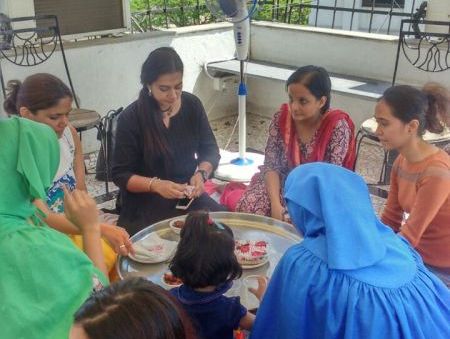
In February, Sahiyo held an event titled Thaal Pe Charcha (loosely translated as ‘discussions over food’), in which 16 Bohra women from Mumbai came together to discuss – for the first time – the challenges of living as young girls and women in the tightly knit Dawoodi Bohra community. Invitations were sent out through word of mouth, and 16 women in their 20s and 30s signed up for the unique event. A few came with their friends, two with young children, one with their family member, while others ventured alone, but all of them attended Thaal Pe Charcha with a desire to bond with other women from the community and discuss a variety of issues affecting their lives. Over a traditional Bohra lunch (one mithaas, one kharaas) the women opened up with their opinions on topics such as the pressure to marry early, the extreme control exercised by religious authorities on family life, the fear of social boycott and the consequent lack of freedom to speak out against social norms. What was evident during the three hours of food and bonding was shared sense of pride the women felt about being able to stand up for themselves within their families – to stand up for their right to an education of their choice, to choose a certain career or spouse, or to have their own set of individual beliefs. Sahiyo will be organizing more Thaal Pe Charcha events in Mumbai during the course of the year, for Bohra women of different age groups. If you are interested in attending a Thaal Pe Charcha event and would like to be kept informed, mail us at info@sahiyo.com After all, why should all charcha happen over chai?
Sahiyo Volunteer Spotlight: Chandni Shiyal
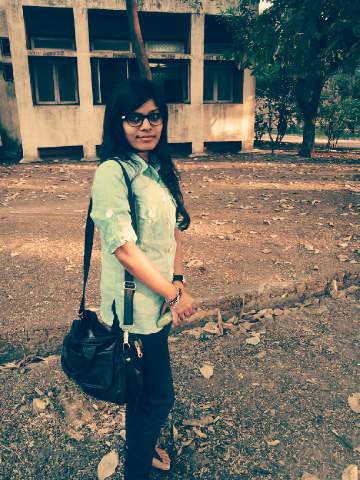
Conversations on khatna and social norms with Mumbai community workers
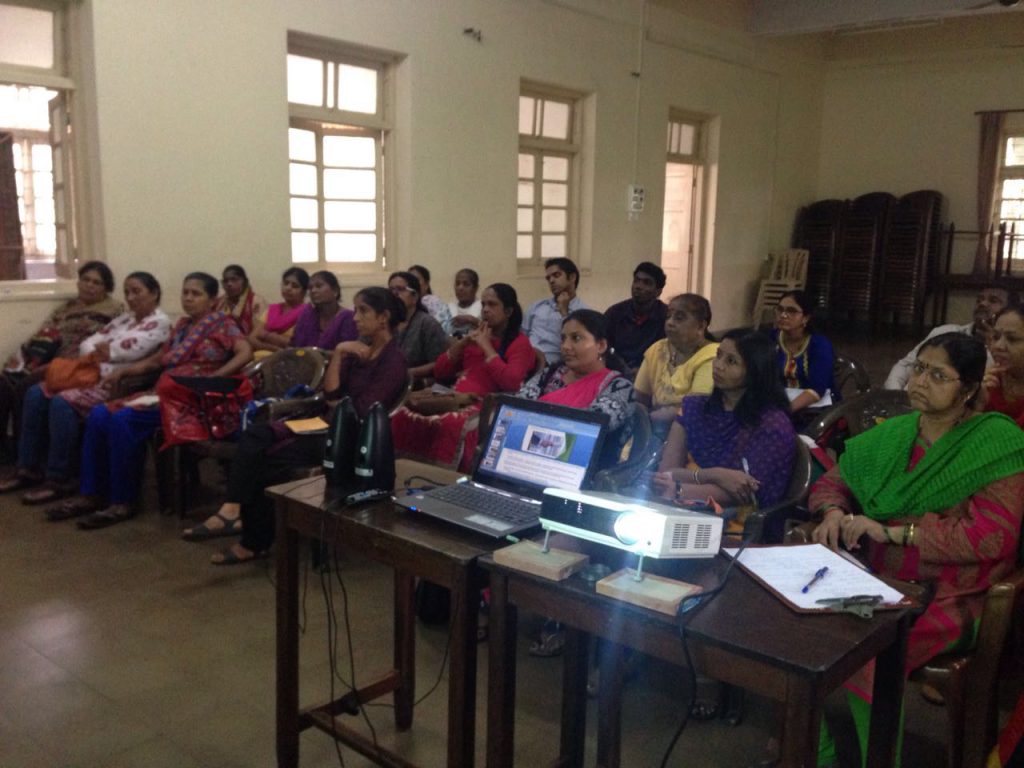
On October 6, Sahiyo co-founders Insia Dariwala and Aarefa Johari were given an opportunity to introduce the topic of Female Genital Cutting to a host of grassroots social workers in Mumbai. This opportunity came through an invitation from the Justice and Peace Commission, one of many organisations run by the Catholic Church in Mumbai to work with local communities across religious lines. The Commission runs community centres across the city, but the session that Sahiyo conducted with more than 20 social workers was held at JPC’s headquarters at St. Pius College. Most of the participants in the session were grassroots activists working in their respective communities and neighbourhoods on a range of issues, particularly women and children’s rights. The topic of FGC or khatna was new to many of them, and they were keenly interested in Sahiyo’s introduction to the issue, the explanation of the reasons cited for practicing khatna and how FGC is essentially a social norm like so many others. Participants were then encouraged to discuss various social norms in their own cultures and how they could possibly be combatted. This was an enthusiastic and very involved audience, and the topic of social norms led to very lively discussions. Predictably, the women grew more lively while talking about menstrual taboos and one woman shared a heartening story of how her young daughter changed the norm in their home by refusing to follow her grandmother’s menstrual restrictions. Most of the participants were women, but the few men in the audience spoke of the pressures to be ‘masculine’ as a social norm. One of the activists talked about how she makes both boys and girls at her NGO do household chores, even though the boys are not expected to do the sweeping or cleaning at in their own homes. After the talk, several participants expressed an interest in discussing FGC with their own Bohra friends. We sincerely thank the Justice and Peace Commission for giving us this opportunity.
Sahiyo at a unique Women’s Day event in Mumbai
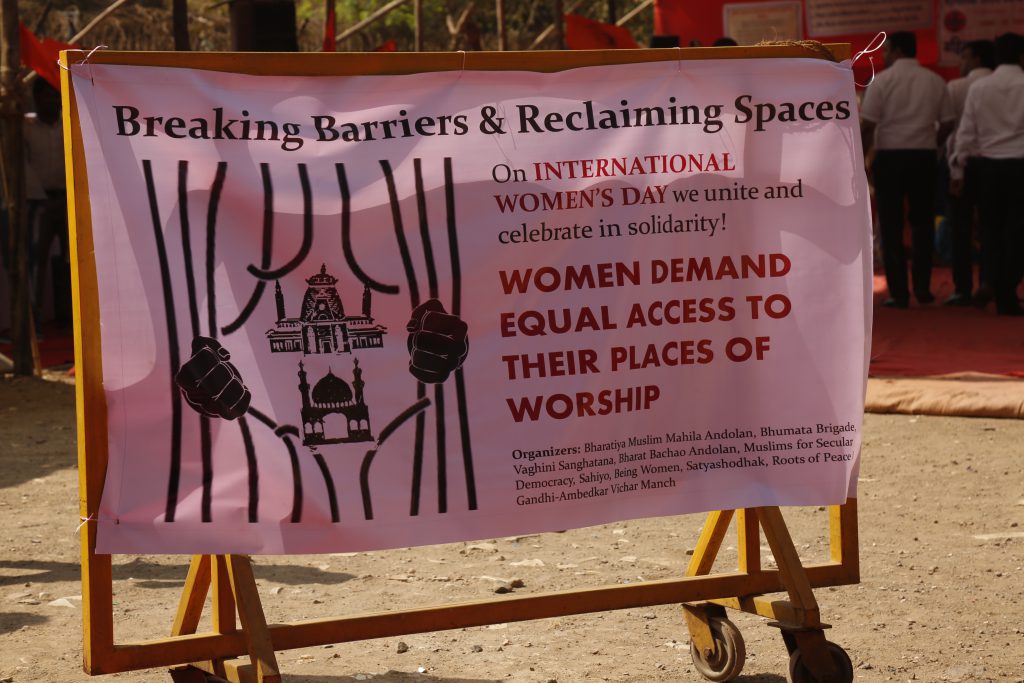
Sahiyo Participates in “Challenges to Minority Women’s Rights and Development in Maharashtra” Roundtable.
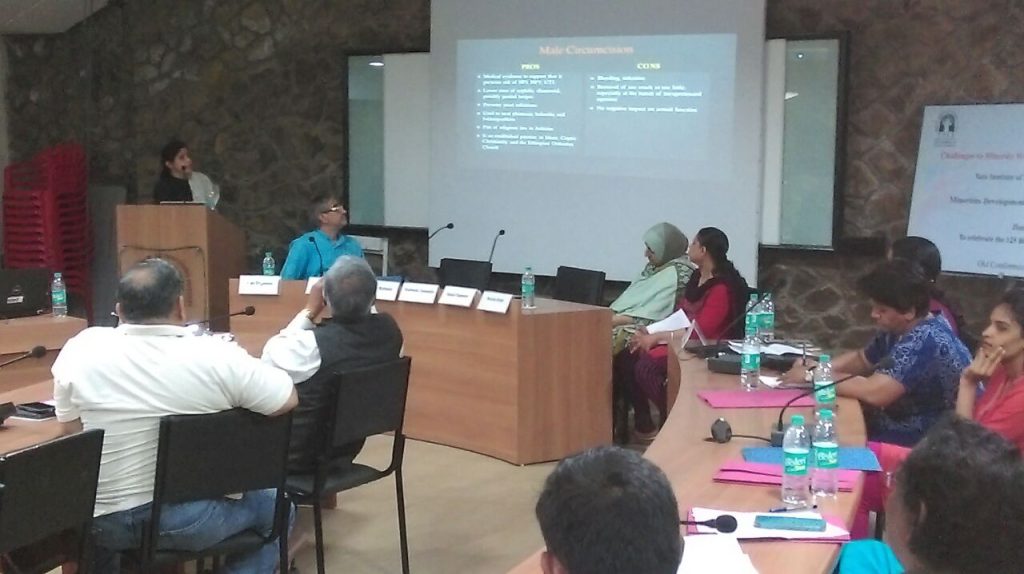
Read Sahiyo co-founder Insia Dariwala’s Women’s Day speech

This speech was delivered by Sahiyo co-founder Insia Dariwala on March 8, 2016, on the occasion of International Women’s Day. The speech was part of a unique women’s rally called ‘Breaking Barriers, Claiming Spaces – Women Unite to Demand Equal Rights Within Religion’. The rally, held at Azad Maidan in Mumbai, was co-organised (among others) by the Bharatiya Muslim Mahila Andolan and the Bhumata Ranragini Brigade, who are fighting for women’s rights to enter dargahs, mosques and temples in India. (To view a video interview of the event, click here.) The speech is in Hindi, transliterated in Roman: “Hum ne hamarey organization ka naam Sahiyo rakha hai. Sahiyo ka matlab hai saheli… kyunki hum maante hai ki samaaj mein sudhaar dosti hi laa sakti hai, dushmani nahi. Aaj yahan jitni bhi aurtein hai, sab ki ek hi ladai hai: samaanta ki ladaai…sabhi chahti hai ki samaaj mein aurton aur mardon ka barabari ka darja ho, unke saath ek jaisa vyavhaar ho…mai bhi iss baat se sehmat hoon. Magar Sahiyo ki ladai samaanta ki ladai nahi hai. Voh iss liye, kyunki mudda hi kuch aisa hai. Mudda hai khatna ka. Shayad aapko pata na ho, par Bohra Muslim samudaay mein ladkiyon par bhi khatna kiya jaata hai. Ladkiyaan jab saat saal ki ho jaati hai toh unke yoni ke upar ke hisse ko – jisse English mein clitoral hood kehte hai – khatna ke naam par kaafi dardnaak tareeke se kaata jaata hai. Yeh riwaaz kai sadiyon se chali aa rahi hai…ladkiyon ko bina bataye, un par yeh atyachaar kiya jaata hai. Iss hisse ko hum maaya ang ke naam se jaante hai…aur voh usse haraam ki boti kehte hai, usse bura maante hai. Kehte hai ki ek aurat ko behkaane vale iss hisse ko kaat hi dena chahiye. Bade buzurg log yeh bhi maante hai ki aisa karne se uss hisse ki tahaarat/safai bani rehti hai. Lekin hum poochhte hai ki aisi safai kis kaam ki, jo ek masoom bachchi ko shaareerik hi nahi, balki zindagi bhar ke liye maansik ghaav de de? Dukh ki baat toh yeh hai ki Muslim qaum mein hamaare samudaay ko kaafi progressive maana jaata hai. Aurton ki izzat karna, unhe padhaana –likhaana, career banaana, unhe har kshetra mein aage badhna …sab allowed hai. Toh phir itne acche vichaar rakhne ke bavajood hum yeh pichhdi soch kaise rakh sakte hai? Agar baat sirf safai ya hygiene ki hai toh kyun na hum unn bacchiyon ko safai ki seekh de? Hum aaj yeh khul ke kehna chahte hai ki humaari kisi se koi dushmani nahi hai. Hum kisi dharam ke khilaaf nahi…hum kisi dharam ko chalaane waale ke khilaaf nahi…hum khilaaf hai toh sirf unn pracheen traditions ke jo ek ladki ke andar ki aurat ko paida hone se pehle hi maar deta hai. Agar kisi ko yeh lagta hai ki hum Bohra samaaj ko badnaam kar rahe hai, toh yeh soch bilkul galat hai. Kyunki badnaami agar hui hai toh voh Australia mein hui giraftaari ki vajah se hui hai. Wahaan rehne waale ek Bohra parivaar par sting operation kar ke unhe khatna jaise human rights violation ke liye giraftaar kiya gaya. Unn mein bachchiyon ki maa bhi shaamil thi, aur yeh bade hi dukh ki baat hai. Kyunki sadiyon se chali aayi parampara ki sazaa uss maa ko kyun milni chahiye? Khaas karke kyunki barson pehle, voh bhi iss parampara ka shikaar thi. Toh hum poochna chahte hai ki aisi sunnat kis kaam ki, jo ek maa ko apni hi bachchiyon se alag kar de, jaise ki Australia case mein hua hai? Kai cases mein toh yeh bhi hua hai ki iss practice ki vajah se biwi aur shohar mein dooriyaan aa gayi hai. Aur yeh hum apne mann se nahi bol rahe hai. Yeh khud unn mardon ne hame bataaya hai. Toh agar ik parivvar ki aahooti sirf bachchi ko saaf ya hygienic rakhne ke liye dee jaa rahi hai, toh mai itna hi kahoongi ki hum aaj ikkeesvi sadi mein hai, jahan na saabun ki kami hai aur na hi paani ki. Phir kya fayda aise riwaaz ka jis se shayad poore pariwaar ko dukh ho? Kya fayda aise riwaaz ka jahan bachchiyon ko saaf banne ke liye apne hi khoon se nahaane ki zaroorat padey? Hum inn sab sawaalon ka jawaab chahte hai. Kyunki hum yahan par aaj sirf apne liye nahi aaye hai. Hum aaye hai unn tamaam aurton ke liye jinko bachpan mein kaata gaya tha. Hum aaye unn auraton ke liye jinko apne shareer par koi haq nahi…jinhe bachpan se hi kaha jaata hai, “tum sirf ek aurat ho, aadmi se alag ho…” Jaate jaate mai yahi kahoongi, ki haan hum alag hai, par kamzor nahi. Haan hum alag hai, par majboor nahi. Meri media se yeh guzaarish hai ki aaj humne yaha par jo bhi kaha hai, usse sirf sansani paida karne ke liye use naa kare, kyunki hum inn shabdon se communication chahte hai, miscommunication nahin.
Join us at Azad Maidan on March 8 to assert women’s equality within religion

8th MARCH – INTERNATIONAL WOMEN’S DAY Women Of All Religions Unite To Fight Patriarchy Within Women Demand Equal Rights To Access Of Places Of Worship Date: 8th March 2016 Venue: Azad Maidan, near CST, Mumbai Time: 2.00 pm sharp Organisers: Bharatiya Muslim Mahila Andolan, Bhumata Brigade, Sahiyo, Vaghini Sanghatana, Satyashodhak, Roots of Peace, Muslims for Secular Democracy, Gandhi-Ambedkar Vichar Manch & Bharat Bachao Andolan Religion has been for a long time considered to be the domain of a select few males. Men alone are claimed to have always been the recipients of divine messages, men have been transmitters of the same and men have always kept to themselves the right to read, interpret and apply religious doctrines to the masses. Thus religion has become a tool in the hands of men to suppress women. And this has been going for a very long time. Women on their part have for centuries accepted the hegemony of men over religion thanks to patriarchal socialisation. Men were the givers of religious knowledge and women were the receivers. And if told that they are inferior, that they are impure, women believed in it because it had the force of religion and hence by default the force of God. With rising consciousness, awareness and an innate confidence in themselves and a strong belief in their own equality before God, women have been raising questions which now are making the men uncomfortable, especially the clergy who have hegemonised religion. It is not surprising that Hindu and Muslim women and women from other minority communities have started raising questions about discrimination within their respective religions. While Hindu women have questioned the restriction on women’s entry into Sabarimala, Shani and Trambakeshwar temples, Muslim women have questioned the decision of the trustees of the Haji Ali Dargah who have stopped women from entering the sanctum sanctorum. Within the Muslim community, Bohra women have begun a campaign to ban the practice of female genital cutting. Bharatiya Muslim Mahila Andolan has filed a PIL in the Bombay High Court to allow women to enter the sanctum of the Haji Ali Dargah. Bhumata Brigade has made valiant attempts to enter the Shani Shingnapur and Trambakeshwar temples while Sahiyo has been running a campaign to demand a ban on the practice of female genital cutting. It is important to now celebrate the coming together of women from different religious diversities and to raise a common voice to demand equal rights within religion from the state. Please do join us in large numbers!
